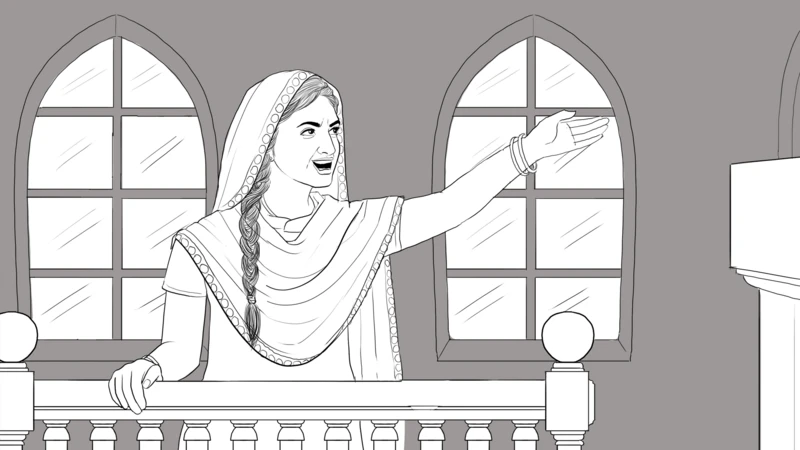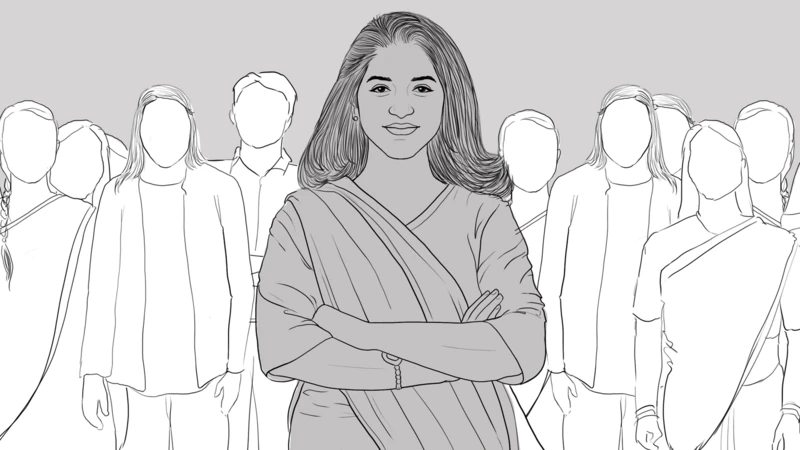‘I was 18 at that time and went to the market to buy a cassette of songs. I remember it was 12 noon at that time. He was my neighbor and knew me. He snatched both the cassettes from my hand and started running. Running we reached the ruins.
Seven, eight people were already there. They tied my face and both my hands.
They all raped me and took nude pictures. After raping me, he gave me 200 rupees and told me to buy lipstick and powder. I refused to take that money.
There were two entrances to these ruins, they let me out the other way. At that time it was four o’clock in the evening.’
Narrating this incident, Sanjana’s (pseudonym) eyes became moist. Sanjana’s hands were shaking and her eyes were downcast.
Sanjana is one of the 16 women who were raped in 1992 in Ajmer, Rajasthan.
The rapists blackmailed these girls for several days and then nude pictures of the girls started being distributed in the city.
The prints of these pictures were taken from a photo lab from where the pictures were leaked.

How did the matter come about?
In the months of April and May in the year 1992, a daily newspaper named ‘Naujyoti’ exposed the matter and started publishing the news.
Santosh Gupta, a journalist working in the same newspaper, told the BBC, ‘This game of blackmailing was going on for several months before the news came out, which was reported from the district police to the intelligence department and the state government, but all were silent.’
The state was ruled by Bhairu Singh Shekhawat at that time and considering the seriousness of the matter, the government handed over the investigation of the matter to the CID Crime Branch.
Recently, a special ‘POCSO’ court in Ajmer convicted Nafees Chishti, Naseem alias Tarzan, Saleem Chishti, Iqbal Bhatti, Sohail Ghani and Syed Zameer Hussain in the case and sentenced them to life imprisonment and Rs. A fine was also imposed.
Some of the 18 accused in this case are absconding. One committed suicide, one has a rape case against him, some are in jail while others have completed their sentences.
Sanjana’s neighbor who took her to the ruins was named Kailash Soni and the court also sentenced him to life imprisonment in this case.
In this case, public prosecutor Virender Singh Rathore says that ‘Kailash Soni was sentenced to life imprisonment by the lower court and he remained in jail for almost eight years, but the High Court acquitted Kailash Soni.’
Sanjana says that she belonged to a poor family and they were very influential. It was a long war, justice was served but belatedly.
Saying this, Sanjana started crying. During this period, Sanjana’s parents, brother and sister-in-law also died.
Sanjana initially did not tell her family about the incident.
“They scared me a lot, threatened me and said that if I tell my brothers, they will kill me with a dagger,” she says in a choked voice.
But this news reached his family.
Sanjana says, ‘I was scared of the threats. Never mentioned it to anyone but, almost three years after the incident, the police came to the house to investigate. That was the first time the family came to know about it.’
Sanjana’s face turned yellow while describing her and her family’s pain.
According to Sanjana, despite everyone knowing, her family remained silent because ‘we didn’t have the courage to stand up to influential people and there was no hope of justice.’
But then voluntary organizations and some policemen explained to him that he should testify in order to punish the accused in this case.
Public prosecutor Virender Singh Rathore says that Sanjana played an important role in providing justice in this case which lasted for 32 years. She was one of the three surviving witnesses in the trial.’
The husband divorced

During all this, Sanjana’s life went on and they got married almost four years after the rape incident.
Sanjana did not want to start this relationship with full trust and truth and did not want to hide this incident from her husband.
She says, ‘I got married in a nearby town. Only four days had passed and the color of henna on my hands had not faded. He heard everything and said nothing at first, but the next morning he asked me to take you to your parents’ house. He brought me here by deception and then divorced me. It was as if my settled world had once again been shattered.’
Sanjana gathers courage in time and four years pass by. Meanwhile, the court proceedings of the case also started going on simultaneously.
The room where we were talking to Sanjana had many pictures hanging on the wall.
Pointing to a picture, Sanjana said, ‘When I was 28 years old, my family gave me a second marriage to this man, I was his third wife.’
‘After some time a son was born to me. It was as if life had begun again.’
She says, ‘My second husband got to know what happened to me from outside. Then he also divorced me and took away my ten-month-old baby from me.’
“He is 22 years old now,” she says, pointing to a picture of her child in the living room. Lives in a country outside India. He is my son in name only.’
‘Living the day with free rations’

Today, Sanjana lives in a rented room and lives with limited resources.
“We spend our days on pension and free ration bills,” she says.
They don’t have jobs. She doesn’t go out much and is getting sick as she gets older.
What memory of this incident remains in your mind? This question was like telling a story of 32 years for him.
“I was very young, I didn’t understand anything,” she says. At that time I did not understand what happened. The question always lingers in my mind as to why this happened to me.’
She says very sadly that ‘in 32 years no one has helped me. When I had to go to court to testify, my uncle used to take me, he took me to court for my first appearance. But then they also died.’
“In 2015, I was called to the court to give a statement. I said to the policeman who brought the summons, who should I come with, there is no one to bring it. Then that policeman took me to the court to make a statement.’
Suddenly she became emotional again and said, ‘I have seen a lot of pain in these years, I have seen my loved ones separated and die. Now the rest of the life will pass like this. What can we do, brother, we know what is written in our destiny.’
Where did the courage to fight such a long war come from? On this question, Sanjana says, ‘This battle has been fought by the media. When I went to the court, I used to get encouragement from him because I would be asked many questions and I would answer them.’


